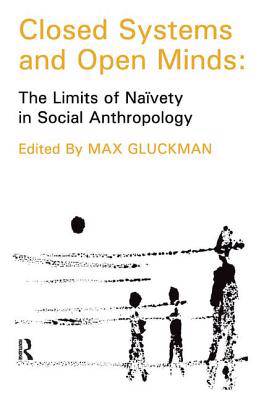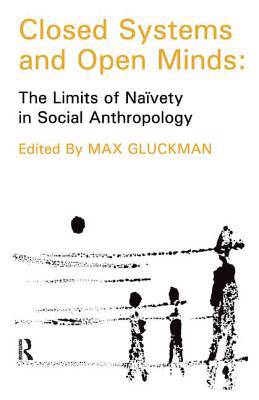
- Retrait gratuit dans votre magasin Club
- 7.000.000 titres dans notre catalogue
- Payer en toute sécurité
- Toujours un magasin près de chez vous
- Retrait gratuit dans votre magasin Club
- 7.000.0000 titres dans notre catalogue
- Payer en toute sécurité
- Toujours un magasin près de chez vous
Closed Systems and Open Minds
The Limits of Naivety in Social Anthropology
Thomas Szasz, Max Gluckman
Livre relié | Anglais
305,45 €
+ 610 points
Format
Description
Social anthropology, defined operationally in terms of what social anthropologists have done in the last fifty years, is the study and comparison of tribal societies and of small fields of social life with emphasis on the role of custom. When a social anthropologist's research leads him into any field, which belongs to other disciplines, what line should he adopt? What use may he make of the results that other scholars have already achieved? Must he knowingly make naive assumptions concerning events, which they have regarded as complex? In each of the fascinating essays which in turn form the core of this book - V. W. Turner's on symbols in Ndembu ritual; F.G. Bailey's on disputes which occurred in two Orissa villages; A. L. Epstein's on urban communities in Africa; T. Lupton's and S. Cunnison's on the relationship between behaviour in three Manchester workshops and certain events which happened outside; and W. Watson's on social mobility and social class in a coalmining Scottish burgh-several social anthropologists attempt to answer these questions by discussing the problems of method that they have encountered in their own recent research; and in the searching discussion which sum up the results. To analyze one first has to circumscribe one's field, and then simplify within the area of circumscription. Both circumscription and simplification may involve procedures of absorbing, abridging, and making naive assumptions. The contributors draw attention to the attempt to distinguish between psychical facts (emotions, thoughts, etc.) and psychological, which we believe should apply only to statements within the science of psychology, and not to be used by the former. They similarly distinguish between social facts and sociological or social-anthropological statements. ""Psychological"" and ""sociological"" are so well established in common parlance as adjectives to categorize facts that attempts to specialize them as hopeless.
Spécifications
Parties prenantes
- Auteur(s) :
- Editeur:
Contenu
- Nombre de pages :
- 276
- Langue:
- Anglais
Caractéristiques
- EAN:
- 9781138520691
- Date de parution :
- 14-07-17
- Format:
- Livre relié
- Format numérique:
- Genaaid
- Dimensions :
- 152 mm x 229 mm
- Poids :
- 539 g

Les avis
Nous publions uniquement les avis qui respectent les conditions requises. Consultez nos conditions pour les avis.






